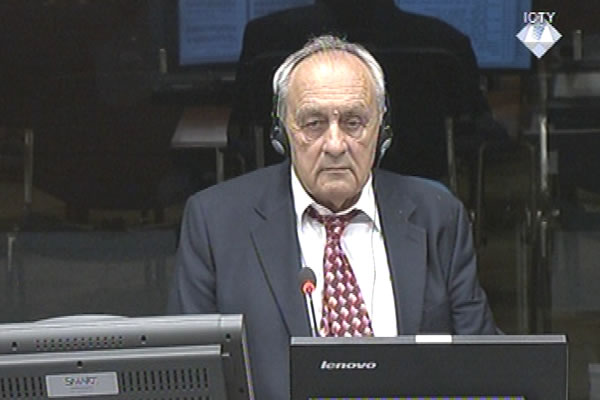Home
'FULL PICTURE OF THE TRUTH' IN MLADIC'S DEFENSE
In 2001, Vojislav Kupresanin was interviewed by the OTP investigators. In his statement, he offered a completely different story than the one he told last year at the Karadzic trial and today in his evidence in the case against Mladic. Confronted with this claim, former Bosnian Serb official explained that in the meantime he had learned new facts and was 'able to put together a full picture of the truth’. The witness did not stint on praise for the accused. Mladic, in turn, applauded his witness loudly and was removed from court
 Vojo Kupresanin, defence witness at Rako Mladic trial
Vojo Kupresanin, defence witness at Rako Mladic trial In 2001, Vojislav Kupresanin, former speaker of the Autonomous Region of Krajina Assembly, was interviewed by OTP investigators. Since then, his account of the war has changed significantly. The prosecutor put it to the witness that he had in the meantime conveniently ‘forgot’ the facts that could harm Ratko Mladic and Radovan Karadzic. On the other hand, Kupresanin ‘brought to his mind’ only the things that could work in Mladic’s and Karadzic’s favor, the prosecutor noted. The witness replied that in both cases he had told the truth. However, the witness explained, in 2001 he didn’t have all the information about the events and only now was he able to offer the ‘full picture of the truth’.
In 2001, when Mladic and Karadzic were far away from The Hague, Kupresanin explained in his statement to the investigators that he ‘got the impression’ that the Prijedor prison camps were established on the orders of ‘someone from the top’. The witness also admitted that crimes were committed in prison camps in Prijedor. Contrary to that, in his evidence at Karadzic's trial, Kupresanin stated that the prison camps were established ‘by the local authorities on their own initiative’. Today, the witness explained that he had heard from Karadzic that ‘some fools did that on their own'. The prosecutor then put it to the witness that he had drastically changed his evidence. ‘What you say isn’t true, what I say is true, you don’t want my truth. What am I to do now?’, the witness replied.
Again in 2001, the witness said that the army had massacred unarmed Croat civilians in the village of Brisevo near Prijedor. As alleged in the indictment against Mladic, at least 68 persons were killed there in July 1992. As far as the witness knew, he ‘probably informed General Mladic’ about that. Today, Kupresanin recounted a completely different story: he claimed he had in fact told General Momir Talic, commander of the VRS 1st Krajina Corps, about the crimes, not Mladic.
The prosecutor recalled that the witness was interviewed for the Talic trial. In his statement, he said he had informed Mladic about the crimes. Today, in his evidence in Mladic’s defense, the witness argued that he had informed Talic, not Mladic. The prosecutor was convinced the witness amended his evidence to favorthe accused.
The prosecutor tendered into evidence a letter sent by the bishop of Banja Luka, Franjo Komarica, to Kupresanin. In the letter Komarica claims that large-scale crimes were committed against Croat civilians in Krajina. Catholic churches were burned down and destroyed causing the Croats' ‘exodus’, Komarica wrote. According to the witness, it was not really an exodus; people ‘did flee’ the territories where crimes had been committed. Kupresanin said Komarica may have sent the letter to Karadzic too, but wasn’t sure if the letter was also sent to Mladic.
In addition to protecting Karadzic and Mladic, the witness today tried to protect Radoslav Brdjanin, former president of the ARK Crisis Staff. However, after a few of the prosecutor’s questions, Kupresanin gave up. In his statement in 2001, the witness didn’t hesitate to blame Brdjanin for the expulsion of non-Serbs from Krajina and the implementation of a ‘radical solution for the national issue’ in favor of Serbs. Today, Kupresanin said that Brdjanin was not an ‘extreme nationalist, he was possibly not a nationalist at all’. The witness was then confronted with parts of his interview with the investigators when he called Brdjanin ‘one of the most radical men in Krajina’, who threatened to reduce the number of Croats and Muslims to an insignificant percentage. Kupresanin admitted that Brdjanin's claims had spread fear among the non-Serbs and contributed to their departure.
When the prosecutor brought up the evidence on Brdjanin’s close connections with Karadzic and with Bosnian Serb generals headed by Mladic, the witness, somewhat unexpectedly startedpraising the accused. As he said, the accused was the only person who stood firm to defend the Serb nation while all other JNA generals had fled. Had it not been for Mladic, Kupresanin noted, Serbs would have disappeared without a trace. The people will remain thankful to Mladic for that fact‘forever and ever’ and Mladic ‘will go down in history as a positive figure’. Obviously Mladic liked Kupresanin’s emotional outburst because he started clapping loudlyin court. The Trial Chamber in turn didn’t like his action, and had him removed from court until the end of the witness’s testimony. Kupresanin will complete his evidence tomorrow morning.
